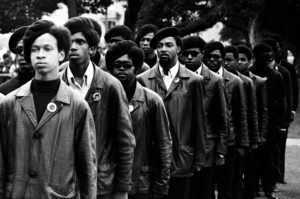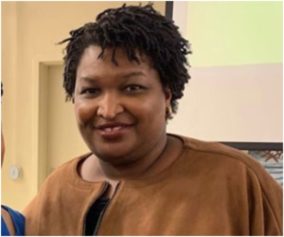
The Panthers developed a 10-point plan that also included neighborhood education, health and nutrition programs. The Black Panthers also had a flair for the dramatic and were savvy about using the media to further their message. They dressed in snappy berets and black jackets, which made them instantly recognizable.
“While King’s humble, dignified, assimilationist approach had been successful to a point, the Panthers — looking terrifically cool in their Afros, leather jackets, shades and black turtlenecks — made African-American empowerment brash, sexy, radical and aggressive. The image and message hugely appealed to Black youth, as well as many progressive white intellectuals, not to mention a burgeoning anti-war collegiate left consisting of all ethnicities,” Dennis Harvey wrote in a review for Variety.
The Black Panthers also stormed the California legislature armed with rifles (which was legal at the time). This caused then Gov. Ronald Reagan to abolish California’s open carry law. Nelson said in many ways, the Black Panthers’ tactics were similar to those used today by the Black Lives Matter movement.
“My understanding is that [Black Lives Matter] is very focused on African Americans getting involved and getting their message across. Part of that is grabbing media attention,” said Nelson. “The Panthers believed that you engage with some people who won’t like you or what you’re doing, but that doesn’t matter. And maybe that was something so brilliant for the Black Panthers to realize: There were gonna be some people who were gonna be pissed off, but that didn’t matter. You don’t have to win everybody. You have to win the people who sympathize with your cause. And that’s similar to Black Lives Matter. They’ve seized upon the media and said here are our issues and we don’t care what you think.”
Nelson said people who have watched the movie say some of the Panthers’ tactics simply wouldn’t work today.
“One of the saddest and [most] telling things in a screening we had early on was when one audience member stood up and said, ‘You couldn’t have the Panther movement today like you did back then, because immediately seeing black people carrying guns would lead to violence,’” Nelson told Fusion. “What does that say? To me it says things have gotten worse, not better. The patrols Black Panthers went on worked, and they were actually nonviolent. There was never a shootout as a result of them. Ironically, one of the things that might cure open carry laws is if you had groups of armed black people patrolling.”
However, the Panthers’ militancy frightened much of white America. President Richard Nixon gave FBI Director J. Edgar Hoover free reign to go after the Black Panthers. The film describes how Hoover, who once described the Panthers as the single greatest threat to the nation’s security, used surveillance, dissention and sometimes outright assassination to break up the group. Black Panthers leader Fred Hampton was shot in his bed while unarmed. Co-founder Huey P. Newton was falsely imprisoned for three years and co-founder Bobby Seale was also jailed. During his trial, the judge ordered Seale to be shackled and muzzled. Another leader, Eldridge Cleaver, fled to Algeria.
According to a review by the A.V. Club, a website that focuses on the film industry, the Black Panthers will be ultimately remembered for having done more good than bad. They were known for their confrontational nature, but their medical and food programs actually helped a lot of people. If the party had managed to survive, it might have picked up more allies. The review also makes another interesting point—America likes to say its for freedom, but it’s not always happy when the wrong people start to enjoy it.


